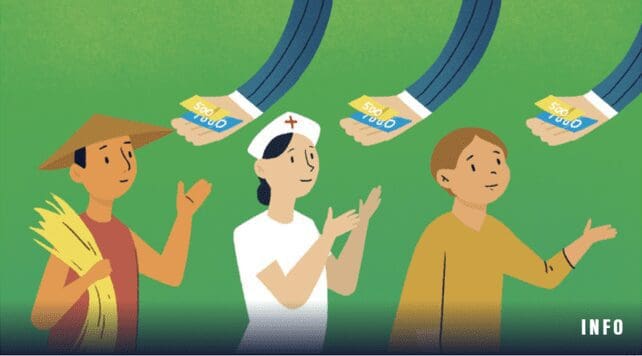‘With UBI, individuals can determine what they need most, at the price they deem best’
The Philippines ended 2020 with poverty and unemployment percentages at alarming levels – 19.8% and 10.3%, respectively. With problems seemingly insurmountable, and with current solutions being ineffective, I propose Universal Basic Income (UBI) as the gamechanger solution for the Philippines.
Effectively, UBI means allocating a portion of tax revenues for re-distribution to all adult citizens.
Applying it to a Philippine setting, I propose the following set of features:
– P1,500 per month per adult citizen 18+ years of age (8-10% of GDP)
– A “use it or share it” mechanism, in which any amount not withdrawn by the end of the month will be returned and shared in the next cycle
– A transparent charity system, wherein people can donate to UBI funds
– A sectoral component, wherein we can target people by region, age, gender, or disease for additional UBI funds or donations. People may also opt to auto-share to their select demographic.
UBI alleviates immediate suffering
Giving cashless people P1,500 per month or P50 per day can get them food on the spot.
Distribution of cash aid through a UBI can also be much easier, through the ATM networks we already have.
If the government wants to provide more aid to specific recipients, it can just credit the funds to their respective accounts. During a pandemic, we can even have combination mobile ATMs/palengkes to increase access to both money and goods.
The transparent charity feature can also help private donations reach more people. I believe that the guarantee that you will have at least P1,500 (or P3,000 for a two-adult household) consistently until your death, will also entice people to be a bit more generous.
UBI creates jobs
The UBI effectively re-distributes P90-billion worth of disposable income to Filipinos, who are mostly low income earners, every month. These Filipinos will likely spend this cash for their immediate needs, which will create more jobs at the local level.
Demand for goods and services will go up, which means more people will be needed to fulfill these goods and services. There will be more taho vendors, more farmhands, more barbers, etc.
UBI reduces government control over the purse
Distribution would be straightforward, without the need for city hall employees to hand out the money. With a UBI system instead of government-procured aid, we can reduce the bad players in government, who practice overpricing and supplier bribery. Each withdrawing individual will now effectively be a checker of the people’s budget.
Individuals can now have the power to select which type of aid they need, too.
One person can buy monggo, another can buy their brand of corned beef, yet another can buy a cellphone for their child’s homeschooling needs. With UBI, individuals can determine what they need most, at the price they deem best.
UBI can be operationalized relatively quickly
Universal programs are easier to implement due to the elimination of evaluation criteria, as compared to welfare with its selection processes. With no selection process, bureaucracy will be limited and edge cases will be assisted. No subset of people will feel disenfranchised and actively campaign against the program.
We can also leverage the National ID program and enrol people in bank accounts for the UBI.
In terms of how to pay for it, there are multiple options depending on each person’s acceptability. My initial inclination is to look into adjusting tax exemptions brackets and consolidating existing welfare programs, which can also be done relatively quickly.
I can see this being done for the most vulnerable (10 million people) in 1-2 years, and for all adult citizens in 5 years.
UBI leads people to better situations
A common fear about UBI is that people will quit their jobs, but commonly, people will only quit jobs that do not work for them.
With larger amounts of UBI, there might be an issue of fewer people working and being supported by people who work. That is why we target the payments at only 8-10% of the GDP, or P1,500 per month. People will likely still work to fulfill all their needs.
If there are people who leave their jobs, they would be similar to these cases:
- The Caviteño carpenter who works in Metro Manila for minimum wage. He spends 5 hours of his day in his daily commute. He will try his luck with jobs in Cavite instead for a more sustainable working setup.
- The kasambahay who gets paid a kasambahay minimum wage (P3,500). She will go back to her province instead to help her father sell their farm produce, and be with her children during the week to teach them how to read and write.
- The fast food staff who just has one more year in her public college education in the best public college in her area. She and her parents are now getting P4,500 every month, on top of her parents’ income as factory workers.
UBI restores human dignity to people who have been in bad situations for the longest time.
UBI provides a path forward
The UBI is a foundation program. It will definitely not solve everything.
UBI and similar programs have been piloted in countries such as the United States, Finland, Canada, and Kenya, and they have had measurable positive impacts on poverty, education, and health indicators, such as increases in household expenditures, purchases of livestock assets, school enrolment and attendance, and health-seeking behaviors.
All of these successes were on a small scale, in foreign lands, with cultures different to ours. I firmly believe, however, that the first large-scale implementation of UBI will be even more impactful if done in the Philippines.
_______________________________________________________
About the Author: Claro Arriola III is an industrial engineer by training and profession. He values efficiency and effectivity, which is why he’s drawn to programs such as UBI.




















